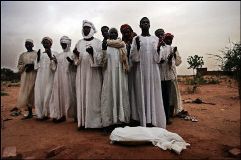FEATURE- White House is quiet as Darfur killings continue
By Guy Dinmore, Financial Times
WASHINGTON, March 14, 2005 — Before long, warns US Senator Jon Corzine, we will be watching a sequel to the film Hotel Rwanda called Hotel Darfur, and asking again why the world failed to stop genocide.

|
|
Relatives mourning over the body of 1-year-old Ali, who died of malnutrition in a refugee camp in El-Geneina in Darfur, Sudan, 2004. (AFP). |
President George W. Bush welcomed to the White House last month Paul Rusesabagina, the hotel manager portrayed in Hotel Rwanda. Mr Rusesabagina saved hundreds of lives in the Rwandan genocide of 1994, while the international community largely abandoned the country.
But during the discussion Mr Rusesabagina warned Mr Bush that the current situation in western Sudan’s Darfur region was “exactly” what happened in Rwanda 11 years ago.
For more than two months, Mr Bush has not mentioned Darfur in public, and the last time he did speak of the two-year-old conflict in western Sudan, which may have cost 300,000 lives and displaced 2m people, it was only in passing.
A White House official insisted the president was “still very focused” on Darfur. “There are other issues that the president finds more pressing,” he explained.
Six months ago it was different. After visiting Darfur, Colin Powell, then secretary of state, told Congress that the killings, systematic rapes, burning and destruction directed against mostly African Muslim villagers amounted to the internationally accepted legal definition of “genocide”.
The US blamed the Arab Janjaweed militia and their government backers. It launched diplomatic efforts to impose an oil and arms embargo on Sudan through the UN Security Council, as well as targeted sanctions, such as a travel ban and assets freeze and a no-fly zone.
Although discussions on a new, watered-down resolution continue at the UN this week, it is widely acknowledged that diplomacy is failing. Meanwhile, security in drought-stricken Darfur is worsening, in spite of the efforts of nearly 2,000 African Union monitors many sent by Rwanda.
US legislators who recently visited Darfur cite estimates of 10,000 deaths each month from killing, famine and disease, though no one knows the true figures. The sense of failure is triggering debate in Washington over whether the world’s superpower is unwilling or unable to commit resources to end a conflict that carries wider ramifications for the US.
Inside the UN, the Bush administration faces considerable resistance from China, the main customer for Sudan’s oil exports, and Russia, Sudan’s main provider of weapons and aircraft. US officials complain that France also opposes an oil embargo, in spite of recent harmony with the US over Syria and Lebanon.
The Bush administration’s opposition to use of the International Criminal Court to prosecute Sudanese war criminals is also delaying a resolution. Mr Corzine, a New Jersey Democrat, says Darfur has undermined the Bush administration’s credibility in its commitment to spreading democracy and freedom. He argues that the US should put more pressure on Russia and China to use their leverage on Khartoum, and should give more resources to the AU monitoring mission.
Ed Royce, a California Republican congressman who recently went to Darfur, said Mr Bush remained “very engaged”. But Mr Royce suggested the US force a UN vote on oil sanctions. Senator Sam Brownback, a Kansas Republican who co-sponsored the Darfur Accountability Act with Mr Corzine, says that if the UN cannot produce agreement, it may be necessary to form another “coalition of the willing”.
This suggestion is backed by influential neo-conservatives, who cite Darfur as another example of the UN’s uselessness and want the US to send military forces to support the AU. The White House regards this option as a very last resort. Sudan, once a haven for al-Qaeda, has generated support from some Islamic states in portraying international intervention in Darfur as a next step, after Iraq, in a western-led war on Islam. Moreover, Russia and China are important allies in the US-led “war on terror”.
But a senior US official argued that the main US constraint was the fear that too much pressure over Darfur would destroy the US-mediated agreement signed in January that ended Sudan’s separate north-south conflict, Africa’s longest-running civil war, which cost some 2m lives.
US hopes appear to rest on a political settlement in Darfur in parallel with the north-south accord, but efforts to reach out to the disparate Darfur rebels have not been easy. Brian Steidle, a US Marine captain, resigned in frustration after spending six months attached to the AU monitoring mission.
Back in the US, he is mounting his own one-man campaign. “We can stop this,” he said. He believes the AU needs 50,000 troops and a clear mandate to stop the violence. But Nancy Soderberg, a former Clinton administration adviser and author of The Superpower Myth, says Darfur like Rwanda demonstrates that nations are not prepared to intervene beyond their spheres of perceived influence. Darfur, she says, exposes the hollowness of the “never again” mantra.
